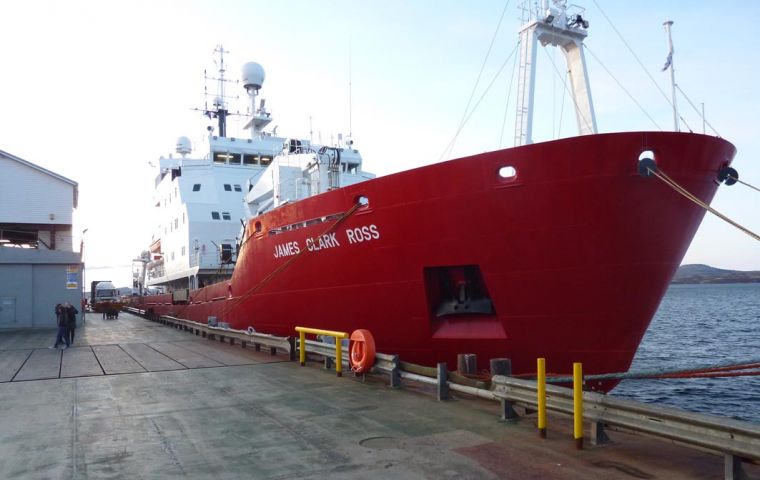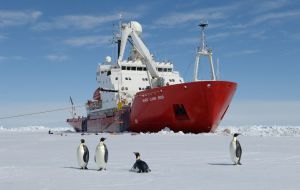MercoPress. South Atlantic News Agency
BAS targets Antarctica marine ecosystem under calved iceberg: nine-country team takes off from Falklands
 The international team, from nine research institutes, leaves Stanley on 21 February on board the BAS research ship RRS James Clark Ross
The international team, from nine research institutes, leaves Stanley on 21 February on board the BAS research ship RRS James Clark Ross 
 “The calving of A-68 provides us with a unique opportunity study marine life as it responds to a dramatic environmental change”, said Dr. Katrin Linse
“The calving of A-68 provides us with a unique opportunity study marine life as it responds to a dramatic environmental change”, said Dr. Katrin Linse A team of scientists, led by British Antarctic Survey (BAS), heads to Antarctica this week (14 February) to investigate a mysterious marine ecosystem that’s been hidden beneath an Antarctic ice shelf for up to 120,000 years. The iceberg known as A-68, which is four times of London, calved off from the Larsen Ice Shelf in July 2017.
The scientists will travel by ship to collect samples from the newly exposed seabed, which covers an area of around 5,818 km2. It is an urgent mission. The ecosystem that’s likely been hidden beneath the ice for thousands of years may change as sunlight starts to alter the surface layers of the sea.
The international team, from nine research institutes, leaves Stanley in the Falkland Islands on 21 February to spend 3 weeks in February-March 2018 on board the BAS research ship RRS James Clark Ross. Satellite monitoring is critical for the ship to navigate through the ice-infested waters to reach this remote location.
Marine biologist Dr Katrin Linse from British Antarctic Survey is leading the mission. She says: “The calving of A-68 provides us with a unique opportunity study marine life as it responds to a dramatic environmental change. It’s important we get there quickly before the undersea environment changes as sunlight enters the water and new species begin to colonize. We’ve put together a team with a wide range of scientific skills so The scientists will travel by ship to collect samples from the newly exposed seabed, which covers an area of around 5,818 km2. It is an urgent mission. The ecosystem that’s likely been hidden beneath the ice for thousands of years may change as sunlight starts to alter the surface layers of the sea.
The international team, from nine research institutes, leaves Stanley in the Falkland Islands on 21 February to spend 3 weeks in February-March 2018 on board the BAS research ship RRS James Clark Ross. Satellite monitoring is critical for the ship to navigate through the ice-infested waters to reach this remote location.
Marine biologist Dr Katrin Linse from British Antarctic Survey is leading the mission. that we can collect as much information as possible in a short time. It’s very exciting.”
The team will investigate the area previously under the ice shelf by collecting seafloor animals, microbes, plankton, sediments and water samples using a range of equipment including video cameras and a special sledge pulled along the seafloor to collect tiny animals. They will also record any marine mammals and birds that might have moved into the area. Their findings will provide a picture of what life under the ice shelf was like so changes to the ecosystem can be tracked.
This newly exposed marine area is the first to benefit from an international agreement made in 2016 by the Commission for the Conservation of Antarctic Marine Living Resources (CCAMLR). This agreement designates Special Areas for Scientific Study in newly exposed marine areas following the collapse or retreat of ice shelves across the Antarctic Peninsula region. The agreement came following a European Union proposal to CCAMLR, led by British Antarctic Survey (BAS) scientists.
Professor David Vaughan, Science Director at BAS says: “The calving of A-68 offers a new and unprecedented opportunity to establish an interdisciplinary scientific research programme in this climate sensitive region. Now is the time to address fundamental questions about the sustainability of polar continental shelves under climate change.
“We need to be bold on this one. Larsen C is a long way south and there’s lots of sea ice in the area, but this is important science, so we will try our best to get the team where they need to be.”
The international team of researchers will spend 3 weeks on board the BAS research ship RRS James Clark Ross.
While the team mobilises for the expedition, glaciologists and remote sensing specialists continue to monitor the movement of the Larsen C Ice Shelf. In December 2017, a team from University of Leeds worked on the remaining ice shelf to investigate changes in ice structure after the calving event, to be able to predict shelf stability in the future.
The research expedition to the Larsen C Ice Shelf is funded by the Natural Environment Research Council (NERC).
The Larsen C research expedition is led by British Antarctic Survey and involves scientists from the following research institutes: University of Aberdeen, University of Newcastle, Natural History Museum, University of Southampton, Alfred Wegener Institute in Germany, Senckenberg Research Institute and Museum in Germany, University of Gothenburg in Sweden, University of Ghent in Belgium and Museums Victoria in Australia.




Top Comments
Disclaimer & comment rules-

-

-

Read all commentsMost of British Antarctica area is claimed by ...Argentina.
Feb 13th, 2018 - 10:01 am +3According to Escude´ this imaginary territory added from 1920 through 1950 included the Argentine Antarctic sector, the South Georgia Islands, the South Sandwich Islands, and the South Orkney Islands, which are included in school texts as if they were provinces, though Argentina exercised no control over these areas, and some were recognized holdings of other nations. From 1938 to 1948 alone, Argentina ''added'' 1.2 million square kilometres of territory, a figure schoolchildren began memorizing in 1947.
To believe that the Falkland Islands and the territories in the Southern Ocean belong to Argentina because of the inheritance is incorrect.
Falklands – Argentina's Inheritance Problem (1 pg): https://www.academia.edu/35194694/Falklands_Argentinas_Inheritance_Problem
Isn't it strange how argieland didn't dare go anywhere near Antarctica until a British (Scottish) expedition offered to give argieland its own research station?
Feb 13th, 2018 - 07:37 pm +3England will return the Malvinas within 25 years.
Feb 22nd, 2018 - 04:40 am 0Commenting for this story is now closed.
If you have a Facebook account, become a fan and comment on our Facebook Page!